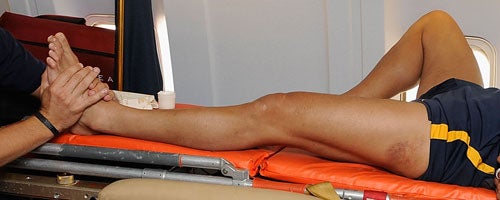
Your support helps us to tell the story
From reproductive rights to climate change to Big Tech, The Independent is on the ground when the story is developing. Whether it's investigating the financials of Elon Musk's pro-Trump PAC or producing our latest documentary, 'The A Word', which shines a light on the American women fighting for reproductive rights, we know how important it is to parse out the facts from the messaging.
At such a critical moment in US history, we need reporters on the ground. Your donation allows us to keep sending journalists to speak to both sides of the story.
The Independent is trusted by Americans across the entire political spectrum. And unlike many other quality news outlets, we choose not to lock Americans out of our reporting and analysis with paywalls. We believe quality journalism should be available to everyone, paid for by those who can afford it.
Your support makes all the difference.
What do you come out with? A BSc in physiotherapy, recognised by the Chartered Society of Physiotherapy and the Health Professions Council.
Why do it? "Physiotherapy is a rewarding career, as practitioners help people of all ages overcome physical problems caused by illness, ageing or injuries. Physiotherapists use a range of interventions to facilitate recovery, and provide advice and support for people to help manage their own health conditions. Although many physiotherapists work in hospitals, they now also work in the community, special schools, the private sector, leisure and sport. A degree in physiotherapy is the first step to becoming a practitioner. To gain a place in most universities, it is important to have an aptitude for human biology or similar area. Furthermore, attributes such as empathy, patience and compassion are vital." - Dr Isaac Sorinola, lecturer in the department of physiotherapy, King's College London
Click here to read about what it's like to study Physiotherapy
What's it about? Physiotherapists are as essential as doctors in helping to rehabilitate a patient from a state of incapacity, due to genetic defect or the result of an accident or an illness. Physiotherapy provides an important rehabilitative service in the community and is a vital therapeutic element of the medical profession. You work alongside a variety of healthcare professionals. Physiotherapy courses focus on developing an understanding of basic and applied sciences and include clinical teaching and placements that will develop your patient management and therapeutic skills. Core units generally focus on applied science subjects and basic concepts of patient management, as well as on disorders of the cardiorespiratory, musculoskeletal and neurological systems. The extensive clinical experience that forms part of the course allows students to apply their theoretical knowledge. Students at King's College London and Sheffield Hallam have to successfully complete 1,000 hours of clinical education during their degree programme.
Study options: A physiotherapy degree lasts three of four years. Assessment is a mixture of written examination and continuous assessment, in the form of written assignments, group work, presentations, case studies, and practical and oral examinations, while on clinical placement.
What will I need to do it? King's asks for ABB, including two sciences, or at least one science and PE. Sheffield Hallam also wants ABB (or 320 UCAS points) with at least one of these being biology, human biology, physical education or chemistry. At Ulster you’ll need to complete the Healthcare Professions Admissions Test (HPAT), as well as securing BBB at A level. At Cardiff it’s tougher – they ask for AAB, including biology or human biology.
What are my job prospects? Great. As with many health care professions, there is a high demand for graduates. There are a huge variety of settings in which a physiotherapist can work, from hospitals, where they may work with the elderly, stroke victims or those in orthopaedic wards, to the community, where they may work with children with severe mental and physical handicaps. Physiotherapists also work in private practice or in sports clinics.
Where’s best to do it? The Physiotherapy Group at King's is one of the most prestigious in the country and the research is strongly grounded in the biomedical sciences. The Complete University Guide 2012 puts Cardiff at top in the “other subjects allied to medicine”, followed by KCL among the universities where you can take a physiotherapy course. Oxford Brookes is first for student satisfaction where you can actually apply for physiotherapy.
Related courses: Medical sciences; biological sciences; sport science; health and social care.
Join our commenting forum
Join thought-provoking conversations, follow other Independent readers and see their replies
Comments